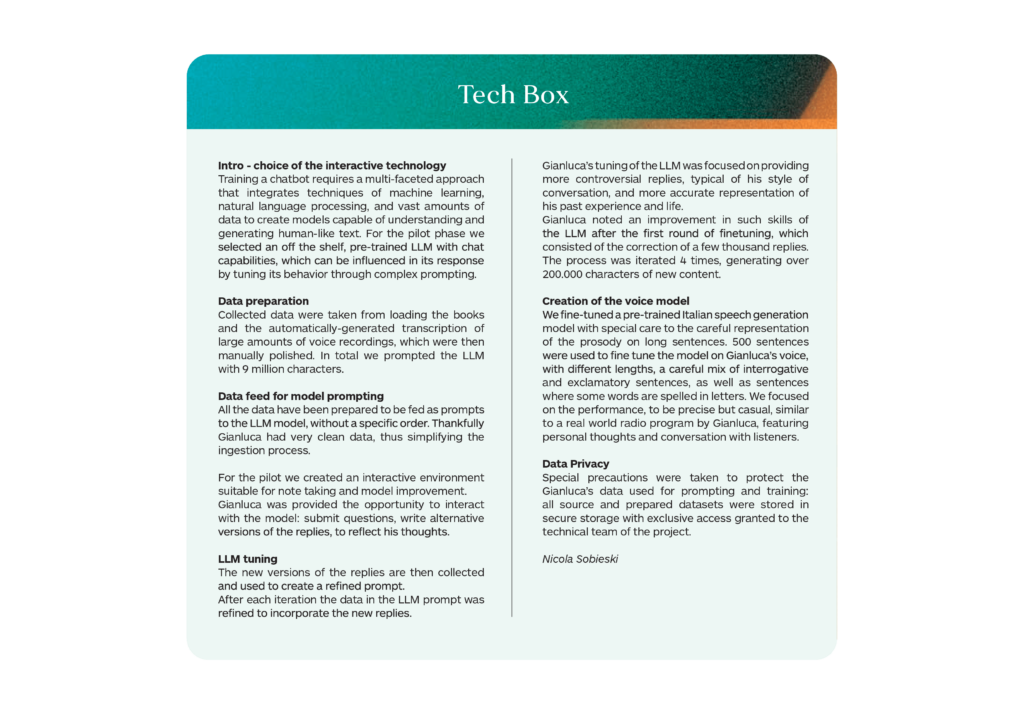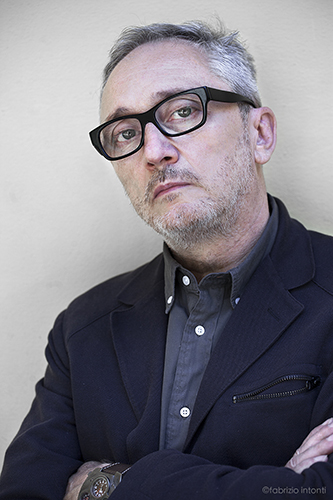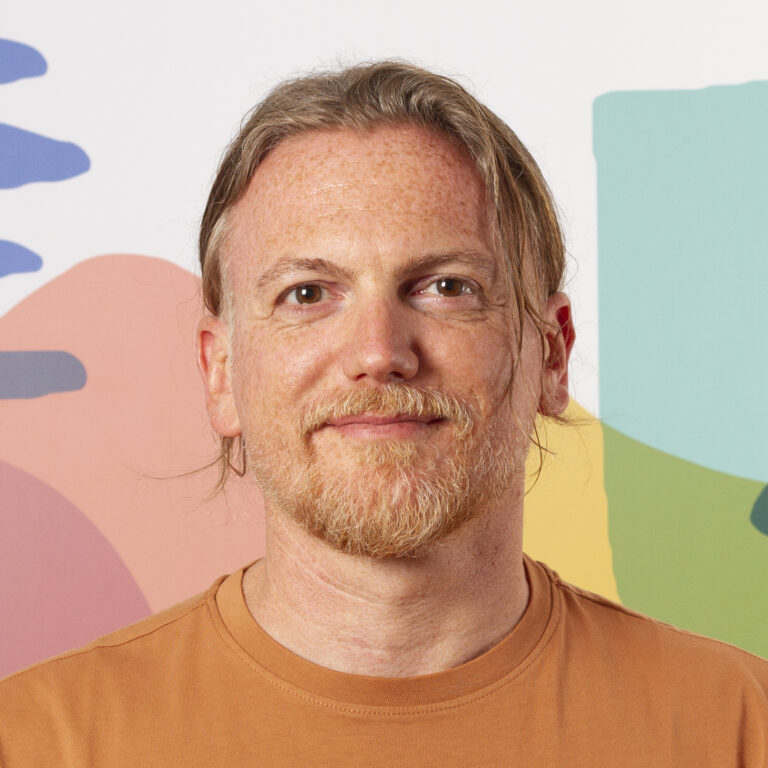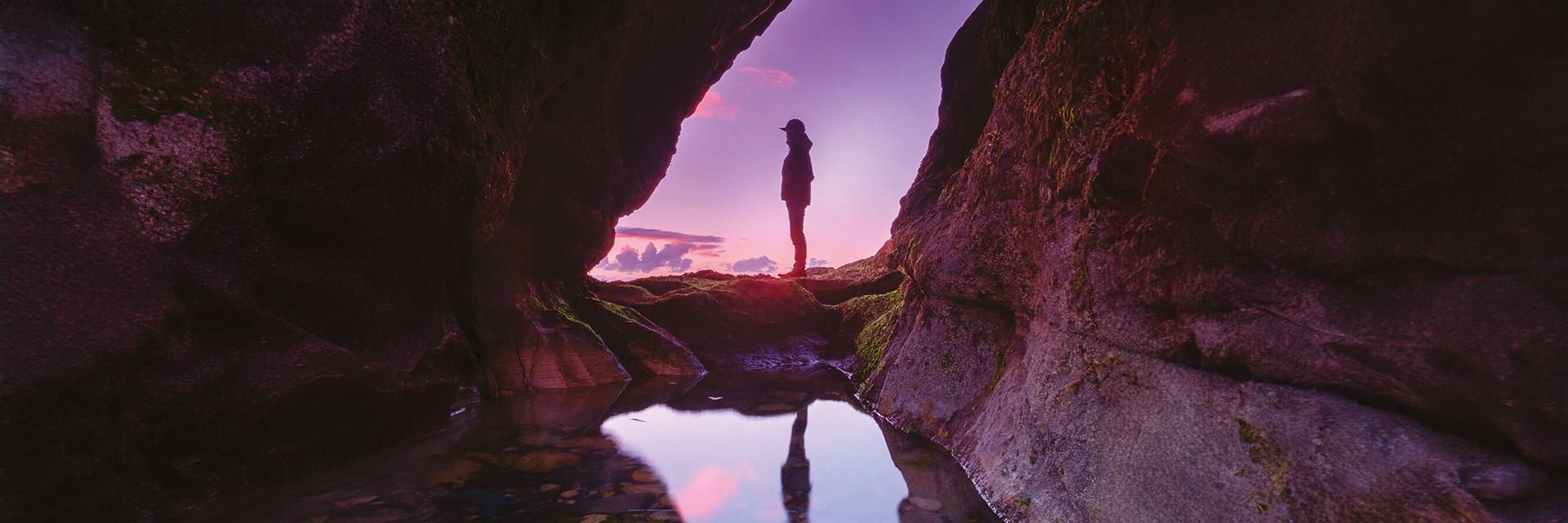Trends
I’ve started teaching a chatbot to turn it into my digital twin. My aim is for it to acquire its own personality by interacting with me, as well as by feeding on what I’ve produced over 40 years as a journalist, writer, and radio narrator. This creature will have my voice, which I feel belongs to me much more than any other piece of biometric data. My voice is the breath that reverberates through my body and supports the words I broadcast every day in front of a microphone. My voice, together with my way of assembling thoughts, is the most significant asset in unambiguously identifying myself as an individual.
I would also like my twin to be able to link the categories of language and speech in the exact combination that I produce, including in all the possible translations into languages I don’t know. Its speech will be universally understood, but structured according to my individual formula. This in itself would be a significant developmental objective for the apprentice with respect to its mentor, who has always targeted an exclusively Italian-speaking audience. My mentorship will be indisputable during the phase of uploading everything that I can transfer from my “consciousness”. Subsequently, my mentee will in turn become a mentor too, tasked with transmitting and developing – through interaction and through time – the experience of the person who “trained” it.
I would also like to experiment with a replicable protocol for an entity with a usable memory. The idea is to develop it into other dialoguing personalities powered by the legacy of all those who have produced original concepts in the fields of literature, thought, the sciences, and societal analysis.
This would define a different way of envisioning containers of knowledge, which are currently available only through static reproductions, confined in immutable fortresses and archives of all kinds. The digital twin, if mindfully nurtured, could continue to interact by basing itself on the mental categories that have allowed its mentor to sustain relationships and build a social life. We should strive to generate a twin that is also capable of following its own original developmental process, gradually constructing its own “uniqueness” in the interactions following the training phase.
The model could also usher in a reversal of the trend towards the mass use of interpersonal prostheses nowadays. In recent decades, digital socializing tools have given each of us the right to “individual epics”. All that will remain of them is the accumulated entrails of what were once existences, wishful desires, ambitions, emotions. Bodies frozen into standard forms. A new phase in our evolution, following the hoarding of social networks, could be the individual possibility of having a dialoguing entity with experience and memory. This could be conceived as a cognitive backup provided to any human being, not just in the event of deterioration caused by disease, but also as part of the legacy of tangible and intangible assets they wish to leave to their descendants.
This will also give us an opportunity to reflect on how the value we ascribe to our “memory” has completely transformed following the rise in digital literacy over the last few decades. Today, it is easier to imagine our consciousness being transferred into and contained within a medium – an external peripheral device – rather than the archaic image of a frozen brain that holds our entire being and that inspired the myth of cryogenics, which was nothing more than a veritable act of faith in the ability of future science to “resurrect the flesh”. It seemed impossible to imagine ourselves being preserved for eternity, detached from the biological housing that contains us.
Its challenge is to investigate a potential new paradigm: can our “thinking” really “evolve” beyond the limits of our existence? Is it possible to generate a credible successor for ourselves merely from the language that conveys the experience?
Our yearning to survive was then refined into a mindset closer to the concept of “cryogenic consciousness”, with the latter inserted into shareable devices. This was therefore an initial step forward in the construction of memorabilia with respect to the archiving of written, recorded, or photographed documentation.
The development of the only child-twin would also tend to overcome the idea of the “dead-bot”, which is merely a freezer for holograms. Its challenge is to investigate a potential new paradigm: can our “thinking” really “evolve” beyond the limits of our existence? Is it possible to generate a credible successor for ourselves merely from the language that conveys the experience? I am aware that our ability to form viable “posthumous” relationships could bring up a new issue regarding the protection of sensitive data, which should extend beyond our biological existence. Clearly, there also remains the question of how much we should continue to feel represented by this emulation of ourselves, or the extent to which we will be able to assume responsibility for its future interactions.

Photo Credit: Luke Leung – Unsplash

Gianluca Nicoletti
Presidente presso Fondazione Cervelli Ribelli Onlus
Gianluca Nicoletti (Perugia, 1954) is a journalist, a writer, and a well-known voice on Italian radio for 40 years. He currently presents on Radio24 and is a columnist for La Stampa. He is the father of Tommy, who is 26 and has autism. Gian Luca works to spread knowledge and best practices around neurodivergence through the Fondazione Cervelli Ribelli, of which he is the president.

Nicola Sobieski
Head of Audiovisual @Translated
Nicola Sobieski is an expert in multimedia localization and AI voices, with over 10 years of experience in the entertainment industry. He currently serves as the Head of Audiovisual at Translated, where he researches and develops innovative solutions for voice-based localization. His mission is to create realistic and expressive AI voices that capture the nuances and emotions of human speech while respecting the cultural and linguistic diversity of target audiences. Nicola has extensive experience as a sound engineer and re-recording mixer, having worked with prestigious clients such as Rai, Mediaset, Discovery, Netflix, Sony Pictures, Universal, HBO, Sky, and Disney. Graduated in Sound Engineering from the Centro Sperimentale di Cinematografia, he brings invaluable technical and creative expertise to his work. Passionate about exploring the potential and challenges of AI voices, Nicola also supervises the voice talents collaborating with Translated.
